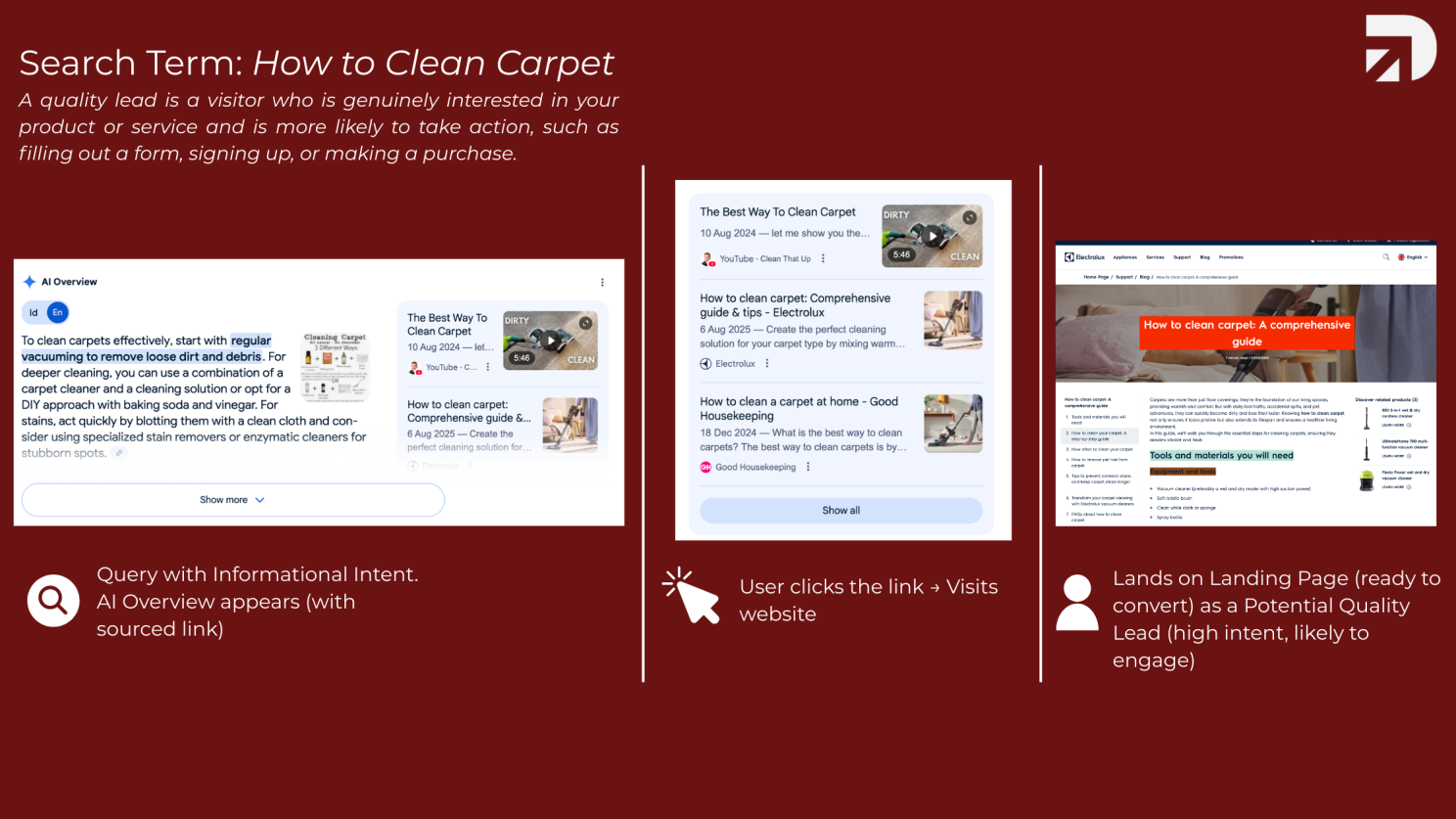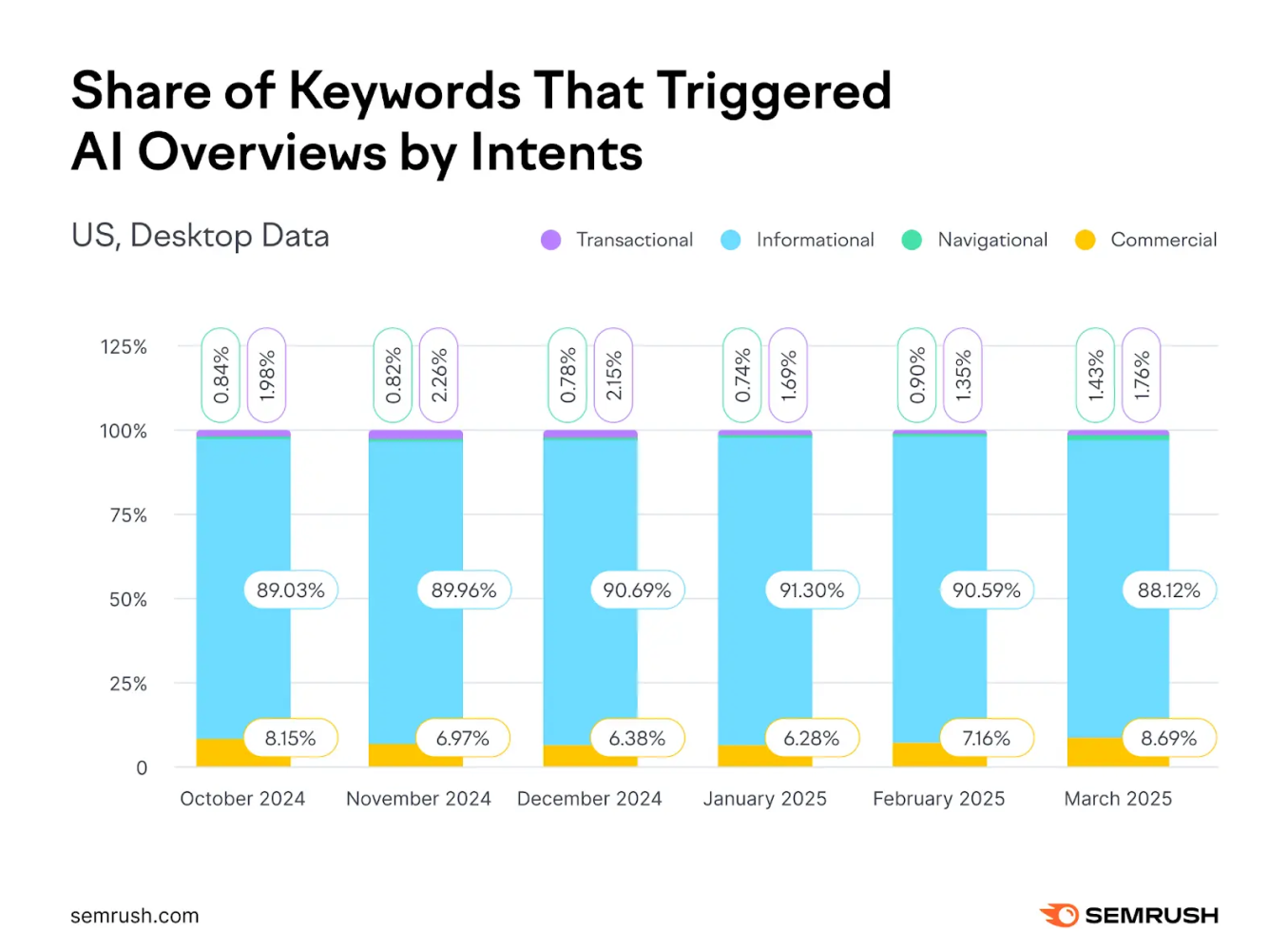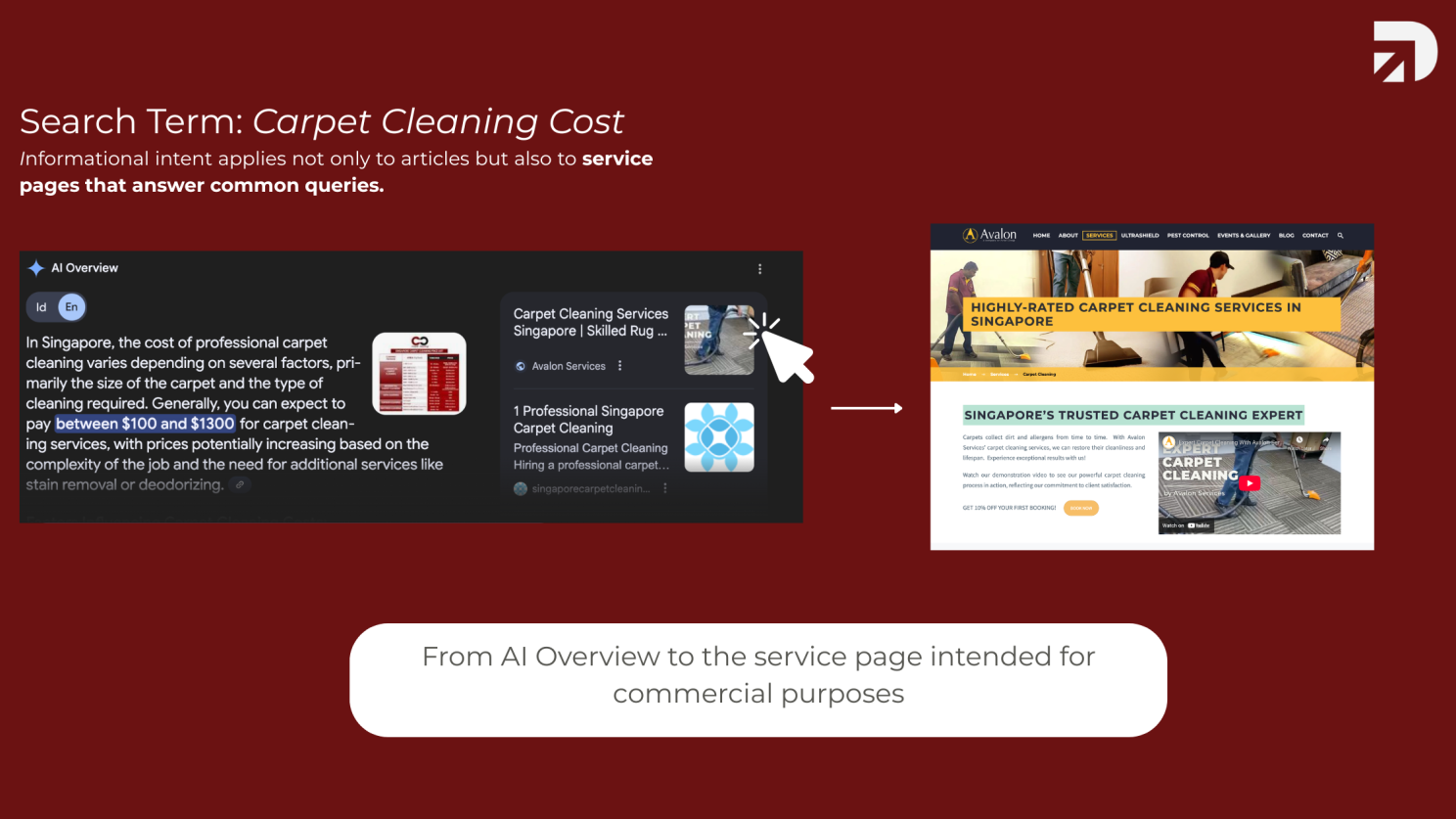Google Search has been evolving its strategy to match how people search and consume information. This revolutionary shift aims to enhance the search experience and is also transforming how SEO works in 2025. Here is how you can stay ahead and win in an era where AI Overviews are growing and dominating.
What is Google’s AI Overview?
AI Overview provides a snapshot of key information about a topic or question, with links to the websites where the sources are found. It summarises content from multiple trustworthy articles or main pages and synthesises it into a single summary that can be read without clicking through to the original sources.
Despite AI Overviews appearing directly in the first row of Google search results, this shows that Google is working to amplify both its search engine and its AI generative answer.
How AI Overviews Impact SEO Ranking?
AI Overviews have been on the rise since their global rollout in March 2025, now appearing in around 13.4% of queries. This signals a shift in how queries are answered and prompts a closer look at the types of searches most affected by this generative response.
Why It Matters:
- These summaries appear above the organic results.
- They increase the likelihood of zero clicks.
- Keywords or queries that trigger AI Overviews often provide enough information to answer the query directly.
- This reduces the need for users to click through to websites on the SERPs.
Will This Impact Small Businesses with Websites?
The short answer is — it is heading in that direction.
Andrew Shotland, founder of the well-known Local SEO Guide, noted that research shows people are increasingly trusting AI summaries, which influences their decision-making when choosing a business. This trend could also help filter out unqualified leads, meaning that users who do click the website link from an AI Overview may be more interested and relevant. However, some websites featured in AI Overviews may see fewer clicks compared to when their site appears in the top organic

Understanding Query Impact on Google Search in 2025
Semrush and Datos analysed 10,000 terms that trigger AI Overviews, revealing how Google has been gradually rolling out this feature. It’s starting with long-tail, low-difficulty informational queries.

While informational content sees the greatest impact, other query types have shown only a small increase so far:
- Commercial queries: from 6.28% in January to 8.69% in March
- Transactional queries: from 1.69% to 1.76%
- Navigational queries: from 0.74% to 1.43%
Since SEO strategies have always relied on quality semantic SEO and keyword targeting, focusing on creating high-quality content in proportion to query types — informational, commercial, transactional, and navigational — can be refined to work alongside Google Search Ranking and its Generative AI Overview.
Refining SEO Strategies in 2025 to Align with AI Overview Growth
The most effective way to re-strategise your SEO efforts is by partnering with an experienced SEO agency. At Digipixel, we offer Search Engine Optimisation services that do not fight against the rise of AI in search but instead leverage it to help keep your website ranking on the first page. This strategy requires SEO tools that combine a deep understanding of technical aspects and terminology with access to premium paid tools.
Step 1: Understanding How a Business Is Presented Online
Like any other marketing strategy, understanding the unique characteristics of your business and your competitors in the vast landscape of Google Search is essential. This involves answering key questions such as:
- Is the website corporate or e-commerce? What it means: This determines whether your website is mainly for presenting your brand and services (corporate) or for selling products directly online (e-commerce). The website type affects your SEO approach and the kind of queries you want to rank for.
- Do you sell products or services/solutions? What it means: Knowing whether you sell physical goods or provide services helps define your keyword focus, content type, and how AI Overviews might present your business.
- What is the intent of prospective clients in relation to your industry? What it means: This is about understanding why people search for your business, are they looking for quick facts, comparing options, or ready to buy? It helps you match your content to their stage in the decision-making process
These three pillars form the foundation of a new SEO strategy, guiding the creation of website content that addresses people’s intentions and questions, ultimately driving them to your site.
Step 2: Selecting Keywords and Defining Their Intent
Selecting keywords requires a deep understanding of your business goals and aligning them with the intent of your prospective clients. This process often relies on paid SEO tools to find the best match between your service offerings and what people are actively searching for.
There are four main keyword types based on intent:
- Informational: Users search these keywords when they are seeking information or answers to a question.
- Commercial: Users search these keywords when they are considering a purchase and comparing products, services, or brands.
- Navigational: Users search these keywords when they are looking for a specific website, brand, or location.
- Transactional: Users search these keywords when they are ready to make a purchase, book a service, or complete another specific action.
According to research by Semrush and Datos, AI Overviews are most dominant growth in the fields of Science (+22.27%), Health (+20.33%), and Society (+18.83%), and Law & Government (+15.18%). These industries are experiencing the highest impact on queries with informational intent.
This indicates that any query with informational intent is likely to be appeared in AI Overview. While such content is often found in articles or blogs, it can also include a homepage or services pages.

This means that content with informational intent remains valuable for AI Summaries, as it can still link users to key pages such as the homepage, FAQ, or service pages directly from the sourced summary.
Important Step:
- Select keyword intent based on business type: corporate sites often target informational keywords, e-commerce sites focus on transactional/commercial, with informational in blogs.
- Use SEO tools to assess keyword traffic.
- Plan content distribution by intent and visualise it with a pie chart.
Step 3: Incorporating Keywords in Website Content
Website content encompasses service pages, the homepage, and other trust-building pages like About Us, as well as product names that can impact Google’s product listings.
To make content work for both AI Summaries and Google search rankings:
- Avoid keyword stuffing: use keywords naturally in clear, readable sentences.
- Answer the query with quality content: follow E-E-A-T (Experience, Expertise, Authoritativeness, Trustworthiness) to make content reliable and helpful.
- Use keywords in headings: add them to H1 and H2 titles for Google recognises their importance.
- Use commercial or transactional keywords in product names and descriptions to improve the chances of appearing in Google Merchant listings and on the first page of search results, instead of the AI Overview.
- Include navigational keywords in the business profile name and description on Google Listing.
Step 4: Apply Google Approved SEO Fundamentals
Many SMEs and even web designers often overlook fundamental SEO principles. It is recommended to plan SEO from the very beginning of website development, during sitemap creation, wireframing, or UI/UX design, to ensure consistent and effective implementation across the site.
The key practices include:
- Develop essential textual content with keywords: Important content should be in text form and include relevant keywords. Enhance this content with high-quality, original images and videos rather than generic or free stock visuals
- Add internal links: Link pages within the website to improve navigation and distribute link authority
- Ensure proper crawling: Verify that robots.txt and hosting or CDN settings allow search engines to access the site. Use plugins or integrate with Google Search Console to manage crawling effectively
- Implement structured data: Apply structured data that matches the purpose and context of each page to enhance search visibility and understanding
Conclusion: Key takeaways
- AI Overviews are changing search behaviour: They appear above organic results and summarise content from multiple trusted sources, influencing how users find information.
- Informational queries are most affected: Content such as articles, blogs, homepages, and service pages with clear, high-quality information is more likely to appear in AI Overviews.
- Traditional SEO is still essential: Meta descriptions, meta tags, URL structure, and E-E-A-T principles remain critical to ensure websites are crawlable, authoritative, and relevant.
- Keyword intent matters: Aligning keywords with business type—informational for corporate sites, commercial or transactional for e-commerce, and navigational for listings—improves visibility and relevance.
- Strategic content placement drives results: Incorporating keywords naturally in headings, product names, and descriptions, as well as in business profiles, helps rank on Google, appear in AI Overviews, and reach qualified traffic.
- AI Overviews don’t replace SEO: While zero-click searches may increase, properly optimised content still drives engagement and meaningful website visits.
- Refined SEO strategy is key: Understanding business nuances, query intent, and AI-generated summaries allows websites to maintain first-page rankings and leverage AI Overviews for competitive advantage.